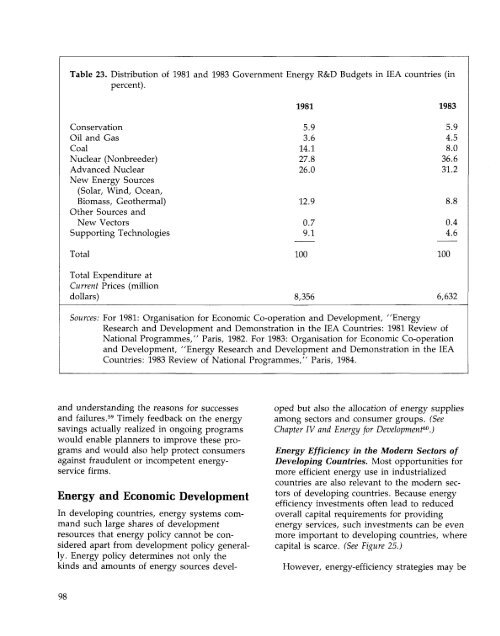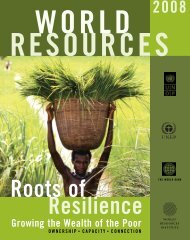ENERGY FOR A SUSTAINABLE WORLD - World Resources Institute
ENERGY FOR A SUSTAINABLE WORLD - World Resources Institute
ENERGY FOR A SUSTAINABLE WORLD - World Resources Institute
Create successful ePaper yourself
Turn your PDF publications into a flip-book with our unique Google optimized e-Paper software.
Table 23. Distribution of 1981 and<br />
percent).<br />
1983 Government Energy R&D Budgets in<br />
1981<br />
IEA countries (in<br />
1983<br />
Conservation<br />
Oil and Gas<br />
Coal<br />
Nuclear (Nonbreeder)<br />
Advanced Nuclear<br />
New Energy Sources<br />
(Solar, Wind, Ocean,<br />
Biomass, Geothermal)<br />
Other Sources and<br />
New Vectors<br />
Supporting Technologies<br />
Total<br />
Total Expenditure at<br />
Current Prices (million<br />
dollars)<br />
5.9<br />
3.6<br />
14.1<br />
27.8<br />
26.0<br />
12.9<br />
100<br />
0.7<br />
9.1<br />
8,356<br />
5.9<br />
4.5<br />
8.0<br />
36.6<br />
31.2<br />
100<br />
8.8<br />
0.4<br />
4.6<br />
6,632<br />
Sources: For 1981: Organisation forEconomic Co-operation and Development, "Energy<br />
Research and Development and Demonstration in the IEA Countries: 1981 Review of<br />
National Programmes," Paris, 1982. For 1983: Organisation for Economic Co-operation<br />
and Development, "Energy Research and Development and Demonstration in the IEA<br />
Countries: 1983 Review of National Programmes," Paris, 1984.<br />
and understanding the reasons for successes<br />
and failures. 59 Timely feedback on the energy<br />
savings actually realized in ongoing programs<br />
would enable planners to improve these programs<br />
and would also help protect consumers<br />
against fraudulent or incompetent energyservice<br />
firms.<br />
Energy and Economic Development<br />
In developing countries, energy systems command<br />
such large shares of development<br />
resources that energy policy cannot be considered<br />
apart from development policy generally.<br />
Energy policy determines not only the<br />
kinds and amounts of energy sources developed<br />
but also the allocation of energy supplies<br />
among sectors and consumer groups. (See<br />
Chapter IV and Energy for Development 60 .)<br />
Energy Efficiency in the Modern Sectors of<br />
Developing Countries. Most opportunities for<br />
more efficient energy use in industrialized<br />
countries are also relevant to the modern sectors<br />
of developing countries. Because energy<br />
efficiency investments often lead to reduced<br />
overall capital requirements for providing<br />
energy services, such investments can be even<br />
more important to developing countries, where<br />
capital is scarce. (See Figure 25.)<br />
However, energy-efficiency strategies may be<br />
98

















